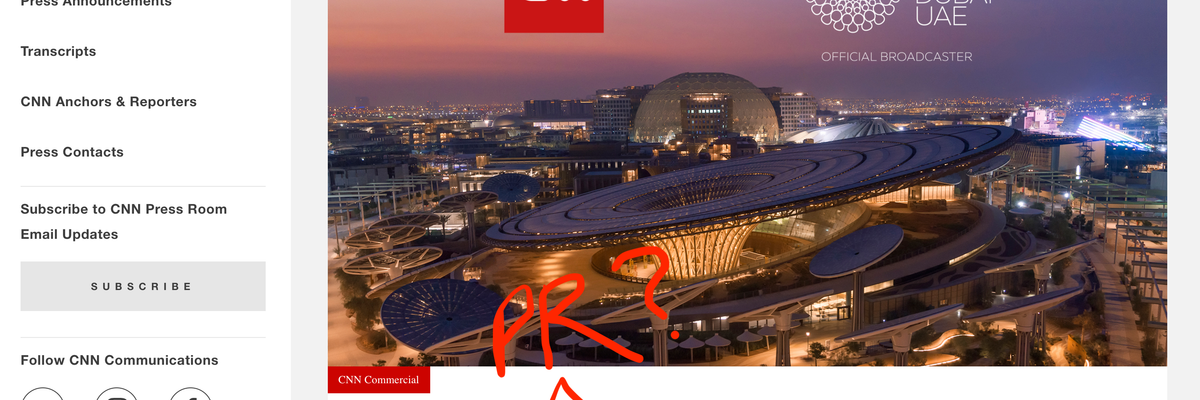The Dubai Expo, launching on Friday, promises “the world’s greatest show” according to spokesperson Chris Hemsworth in a commercial featuring a flying subway train, “opportunity, mobility, sustainability, the finest examples of human ability,” ballroom dancing androids, and flying whales.
The CGI-infused-circus might not reflect the reality of the United Arab Emirates’ problematic human rights record, backing of the Saudi-led war in Yemen, or its alleged efforts to infiltrate the upper echelons of the Republican Party, according to an indictment against Trump fundraiser Thomas J. Barrack. But it is a concise example of the full-court-press branding campaign surrounding the Expo, a six month extravaganza reportedly costing the United Arab Emirates $7 billion.
And what’s the Expo’s special weapon in selling its whitewashed version of Dubai and the UAE? CNN. The cable news giant is, according to a CNN press release, the Expo’s “official broadcaster.”
“As the eyes of the world turn towards the UAE from October-March for Expo 2020 Dubai, CNN will be an Official Broadcaster for the event, bringing unrivalled coverage to global audiences and staging a prominent presence at Expo itself,” said CNN.
CNN doesn’t specify whether the Expo is paying for the extensive coverage. But the press release boasts the network is planning live coverage on its “flagship shows Connect the World with Becky Anderson, Quest Means Business, and CNN Talk.”
Ambiguity about CNN’s role in covering the Expo, a track record of producing sponsored content for Dubai and publication of a slew of articles profiling Dubai and promoting tourism in the emirate raise ethical and legal questions.
"CNN's relationship with the dictatorship that rules the United Arab Emirates lacks transparency,” said Sunjeev Bery, Executive Director at Freedom Forward, a group leading a boycott effort against the Expo. “The UAE's rulers have long used propaganda campaigns to hide their horrible human rights crimes, and CNN appears to be playing a role in supporting this dictatorship's PR agenda."
The news network appears to have a longstanding financial relationship with Dubai to promote the emirate. Responsible Statecraft asked CNN for clarification about its role as the “official broadcaster” of the Dubai expo, whether the network continues to produce sponsored content for Dubai, and what controls clients in Dubai hold or held over the network’s production of sponsored content.
RS also asked whether CNN’s production and distribution of sponsored content for clients in Dubai falls under the Foreign Agent Registration Act, a statute requiring registration for entities within the United States serving as “as a foreign principal’s public relations counsel, publicity agent, information-service employee, or political consultant,” according to the Department of Justice.
Neither CNN nor its parent company, Turner Broadcasting, are registered.
CNN did not respond to the questions.
"These 'news articles' read like propaganda or, at best, tourism brochures,” said Ben Freeman, director of the Foreign Influence Transparency Initiative at the Center for International Policy. “Many foreign governments' tourism promotion boards are registered under FARA, and their work doesn't seem to be much different from what CNN is doing for the UAE."
CNN promotes its paid work for Dubai in a case-study on the reach and impact of its commercial work for clients. “Dubai sought to expand on their reputation as a leading destination for business, commerce and events, specifically targeting those who had never been to Dubai and those who had only ever used Dubai as a stopover,” says the study.
“Utilising the reach of the CNN platforms, a series of 10 videos were put together, highlighting Dubai’s broad culture using their trademark cinematic storytelling to inspire,” said CNN.
CNN’s labeling of sponsored content for Dubai appears inconsistent and, in some cases, downright confusing.
A February article titled, “Dubai gives a glimpse inside its Expo Sustainability Pavilion,” featured a video about the Expo and promoted the sustainable energy initiatives providing a portion of the Expo’s electricity needs.
“CNN's series often carry sponsorship originating from the countries and regions we profile,” said an “editor’s note” at the top of the article. “However, CNN retains full editorial control over all of its reports.”
CNN did not specify whether the article or video promoting the Expo were, in fact, sponsored content.
On Facebook, a series of videos were prominently labeled “sponsored by Visit Dubai” but at least one of those video segments was published on CNN’s website with no disclosure that it was sponsored by Visit Dubai.
Earlier this month, journalists Gabe Levine-Drizin and Adam Johnson flagged that “CNN has a travel vertical called ‘Dubai Now’ that focuses exclusively on how wonderful, fun, progressive, tolerant, and innovative the Gulf dictatorship of the United Arab Emirates is, and the outlet won’t say if the articles are paid PR for the Emirati regime.”
They cataloged 105 articles appearing to promote Dubai tourism since the beginning of November 2020 containing no disclosure of CNN’s creation of sponsored content to promote travel to Dubai or CNN’s role as the “official broadcaster” of the Expo.
The six-month-long Expo begins on Friday and, according to CNN, its coverage of the event is only ramping up. If the network’s opacity about its relationship with the Expo and Dubai tourism continue, it may pose an ongoing challenge for efforts to distinguish its independently produced journalism from state-sponsored content promoting a sanitized image of an undemocratic nation with a problematic human rights record and a history of seeking illicit influence over U.S. foreign policy in the Middle East.
















